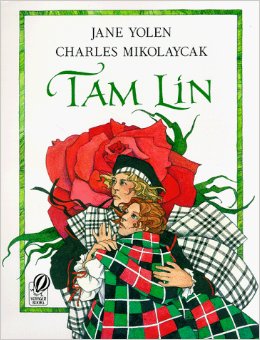Not unlike many kids, I was surrounded by fairy tales while I was growing up. While stories of princesses and the people who save them—or don’t save them, in the case of The Paper Bag Princess—took up the majority of the narratives, I was lucky that my mother had a tale that fell out of the norm. The story that would become one of my favorites, in addition to influencing my ideal of what a female protagonist should be? The Scottish ballad Tam Lin.
For those interested, you can read the ballad here and a different retelling here, but allow me to summarize. A young girl named Janet, along with her family, have been kicked out of their ancestral home (Carterhaugh) by the fae folk; however, Janet isn’t content with letting what’s rightfully hers go to ruin. Despite warnings of the danger of the fae, especially one particularly bewitching man named Tam Lin, Janet heads to Carterhaugh to reclaim it. On the way, she picks a rose which summons the titular Tam Lin. Upon discussing her reasons for being there, he reveals that, although he has been the queen of the fae’s favorite for many years now, she has grown tired of him and is going to sacrifice him on the upcoming All Hallows Eve. Since Tam Lin has no one, Janet vows that she will save him as well as reclaim her Carterhaugh. On All Hallows Eve when the fae ride across the moors, Janet pulls Tam Lin from his horse. Though the queen of the fae changes his form—even sets him on fire—Janet holds fast. And though the queen offers Janet many riches, including Carterhaugh, Janet is not swayed. By trusting in herself she repels the fae queen’s magic and by this and saving Tam Lin, at daybreak the queen of the fae leaves Janet’s family’s lands—All Hallows Eve is the only night on which the fae have power over the mortal realm, and by this point she was probably disgusted at Janet just on principle. In the end, Janet does what she set out to do—protect Tam Lin and reclaim her Carterhaugh.
From a magical standpoint, Tam Lin is interesting to me because it presents magic as an oppressive tool. Typically in fiction, if magic is presented as evil, it’s done in two ways. First is a scenario like in the Harry Potter series, where those with oppressive magic are pitted against another force with magic that are painted as the good guys. Even if the ones with oppressive magic are stronger, the good guys still have the ability to defend themselves and, most likely, are able to get strong enough to overcome the oppressive forces. The other scenario is like what we find in mythology, especially Greek, where the ones with magic are all-powerful and the un-magical are helpless to stop it, so they endure. Usually in these situations it’s because of the magic users’ own pride that they face defeat, or in-fighting between the magic users themselves rather than any influence from mortal/non-magical folk. There’s a sense of hopelessness and powerlessness there for non-magicals. However, in Tam Lin’s case, this helplessness isn’t so much a fact—unlike, say, Greek mythology, where no one really thinks going up against Zeus is a good idea—as much as it’s a societal barrier.
As much as any mythical creature, fae can be seen as kind of assholes, but they have no specific morality to them; there are as many “good” fae as there are “bad”. While it doesn’t seem like the best idea to go against the queen, of all things, it also doesn’t seem like an impossible task. Even without Tam Lin’s help, Janet is willing to risk herself to reclaim Carterhaugh, knowing full well what has happened to many of people who have ventured into fae territory before her. Janet has power because she believes she has power, and it’s this belief in herself that calls Tam Lin to her aid.
I also find it interesting that all of the goals in this tale come from a place of selfishness, but are not vilified—Janet wants Carterhaugh back because it is her birthright and Tam Lin offers to help her because he doesn’t want to die. Yet both of these are shown as acceptable reasons without some form of divine punishment at the end. Janet’s Carterhaugh is returned in full without it having turned to rubble or having some curse placed on it, and Tam Lin is allowed to live his life as a human instead of something like a tree.
In both of these points—personal strength overcoming large hurdles and un-punished selfishness—Tam Lin enforces the idea that oppression is not only something that can be overcome, but something that should be overcome. Though stories that use magic as an analogy to an oppressed groups are still important, stories that allow oppressed groups to overcome magical oppressors by their own gumption are also very important. Sometimes it seems that under the watch of those more powerful than us, it’s impossible to live life how it ought to be lived. However, knowing that it’s not impossible, that these oppressors can be overcome, is an empowering narrative all on its own.
Follow Lady Geek Girl and Friends on Twitter, Tumblr, and Facebook!




There needs to be a movie made out of this, srsly.
I would die from happiness if someone made a movie from this. Come on, Hollywood.
I know this is an old entry – but ever read Diana Wynne Jones’ Fire & Hemlock?